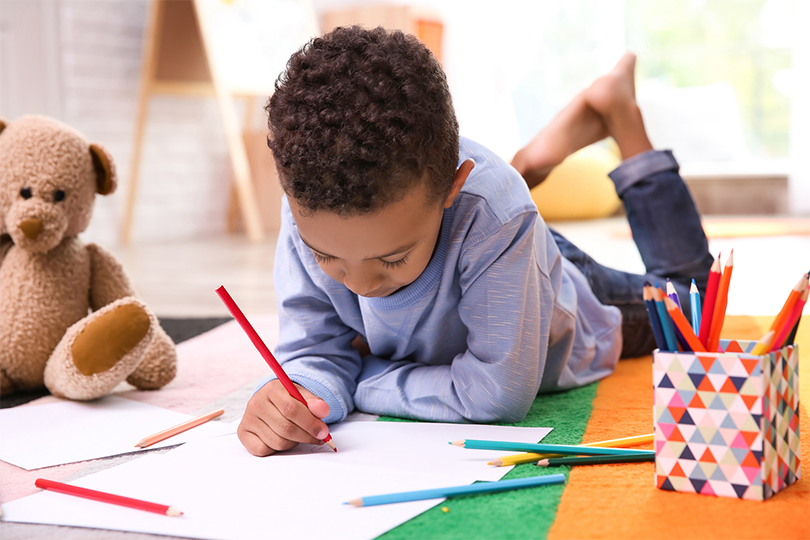Once upon a time, kindergarten was a major rite of passage in a child’s life.
These days, it’s all about preschool.
About 1 in 3 children in the United States attends a preschool program, some as young as age two and a half. Much more than “mother’s day out” or daycare, preschool provides a structured curriculum to help children prepare for kindergarten and beyond, teaching socialization skills, cooperation, structure and, most importantly, a foundation for lifelong learning.
“Even if a child has had considerable experience in daycare, preschool is different. Children are expected to do things with the rest of the class. They must sit at a table, play in their designated centers, nap, eat and go outside for free play according to a schedule,” said Kym Allen, a child life specialist at the Children’s Hospital of Georgia.
Is your child ready for preschool?
If you know that you plan to send your child to preschool, you can help prepare them by reinforcing something you probably are already doing: a routine.
Routines are not only comforting since they help children know what to expect, but they also help children adapt to the routines of school, where they often have to do what is expected of them instead of what they would like to do, said Allen.
So at home, follow a set morning routine and a nighttime routine. If you care for your child at home, follow a daily routine too with snacks, lunch and nap at the same time every day.
If your child has never attended a full-time daycare, being away from mom or dad for a much longer time can be hard to adjust to. Expect some separation anxiety. While it can be hard to leave while your baby is clinging to you and crying, plan to make your goodbyes calm, short and sweet.
Your preschool may also have rules about children being potty trained. Keep on practicing at home, and practice other skills too, such as opening a backpack and lunchbox, eating without help, putting on and taking off jackets, and more.
Let’s Go to Preschool!
You know the excitement your child has when you announce that the family’s going on vacation? While you don’t want to talk it up as much as say, a trip to Disneyland, make getting ready for school an event.
But don’t start too early. “Begin starting to talk about school a week or so before you go to visit or attend an open house,” said Allen. “A month for preschooler is an eternity. They understand time in the construct of a Paw Patrol episode or a video game session. Trying to explain school too far ahead of time will only increase their opportunity to form fears and misconceptions.”
One way to explain what to expect is to read books about school to your child. You can also create dramatic play opportunities at home about children going to school, getting dropped off by parents and, most importantly, reuniting with parents following the school day. An added benefit? “Children will play out their fears and misconceptions if given the opportunity in a trusted environment,” said Allen—so that you have a chance to help answer those fears and questions.
Also, make your child part of the process. Plan a special shopping trip to pick out a lunchbox and backpack, have children choose that first-day outfit and get them to help pack lunch. “All of these help your child have a sense of control in their new environment,” said Allen.
A special treat in a child’s backpack or lunch box is also a reminder that the caregiver is thinking of them. Allen, who’s a mom to two, said, “A fun trick I did was to kiss their arm at drop-off, leaving a bit of a lipstick kiss until I returned later that day to pick them up.”
It’s also very important for you and your child to tour the school prior to going, so mark that date on your calendars—and make sure to keep it. Most schools offer an open house where kids can meet their teachers, see their desks and cubbies, find out about various activities in the classroom and more.
Don’t Worry, Mom and Dad
Even if you’ve taken your child to daycare, preschool can feel different to parents, especially if it’s a new setting where your child won’t know anyone else. But try not to worry: “Children are typically very social and will make friends in new environments,” said Allen. “They learn to play together and often relate over common interests. Parents can assist by talking with their child about who they are playing with and touching base with the teacher should they be worried about this.”
And if this is really the first time you’ve had your child in a formal program, expect a lot of emotion, including all the joy and sadness of seeing your little one—who it seems was just a baby yesterday—growing up. Just don’t let your child see how emotional you really are. “Children can read their parent and will sense if they are highly anxious about this milestone,” said Allen. “Then comes the question: ‘If Mommy is scared/anxious/tearful about this experience, why is she leaving me here?’”
So stay positive—even if you have a breakdown in the car after dropoff. While preschool is a transition and challenge for everyone involved, it’s a necessary one—and one that both you and your child will enjoy.





It is a very good place for the children to learn and enjoy for their better future.
My daughter is very social, as you said, and I think you’re right that she’ll do well making new friends when she goes to preschool for the first time this coming fall. I’m the one that tends to get the most anxious about sending her into new situations, and it’s good to know that I should be working to tone that down. I didn’t realize that kids can read their parents as you said they can, so I’ll definitely take your advice and stay positive throughout the transition.